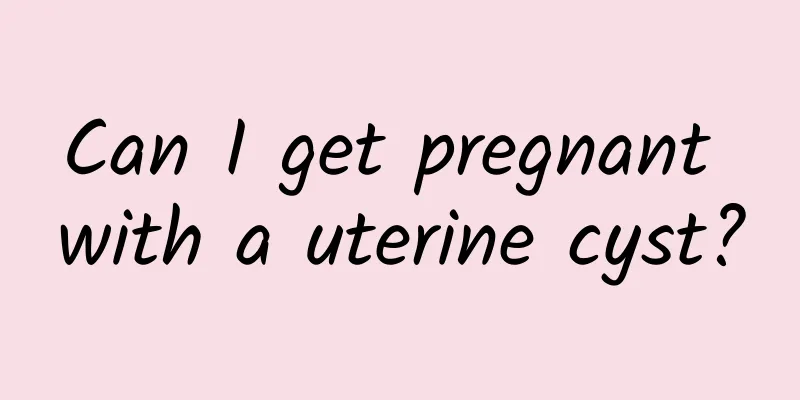Can I get pregnant with a uterine cyst?

|
Whether to keep the fetus after pregnancy with uterine cysts requires a comprehensive assessment based on the nature and size of the cysts and the health of the pregnant woman. It is recommended to seek medical attention in a timely manner to make a clear diagnosis and develop a personalized plan. Uterine cysts may affect the health of the fetus and pregnant women during pregnancy. Ultrasound examinations, blood tests and other means are needed to clarify the nature of the cysts. If they are benign and small in size, the pregnancy can usually be continued and monitored regularly. If the cysts are malignant or large in size and compress the uterus, termination of pregnancy or surgical treatment may be required. 1. The nature of uterine cysts is the key factor in deciding whether to keep the fetus. Benign cysts such as functional cysts and endometriosis cysts usually have little effect on the fetus, and the pregnancy can be continued under the guidance of a doctor and regular check-ups. Malignant cysts such as ovarian cancer may pose a serious threat to the health of pregnant women and fetuses, and timely termination of pregnancy and treatment are required. 2. The size and location of the cyst will also affect the outcome of pregnancy. Smaller cysts usually do not cause significant compression to the uterus and fetus, and the pregnancy can continue; if the cyst is larger or located in a critical part of the uterus, it may affect fetal development or cause miscarriage, and whether to terminate the pregnancy needs to be decided based on the specific situation. 3. The overall health status of the pregnant woman is an important basis for the assessment. If the pregnant woman has other serious diseases or complications, it may increase the risk of pregnancy, and the cyst situation needs to be comprehensively considered to decide whether to continue the pregnancy. 4. The treatment plan should be formulated according to the nature of the cyst and the condition of the pregnant woman. Benign cysts can be treated conservatively, such as regular monitoring, medication such as progesterone, birth control pills, etc. Malignant cysts need to be surgically removed in a timely manner, combined with chemotherapy or radiotherapy if necessary. 5. Management during pregnancy is crucial to reduce the risk. Pregnant women need to undergo regular prenatal checkups to monitor cyst changes and fetal development, while also paying attention to a balanced diet, avoiding strenuous exercise, and maintaining a good mental state. Whether to retain the fetus after pregnancy with uterine cysts requires a comprehensive assessment based on the specific situation. It is recommended that pregnant women seek medical treatment in a timely manner and develop a personalized plan under the guidance of a doctor to ensure the safety of mother and child. |
<<: What does right ovarian cyst pelvic fluid mean?
>>: What disease will cervicitis turn into after it becomes serious?
Recommend
How is cervical erosion caused?
How does third degree cervical erosion occur? Thi...
There are many tests for bacterial vaginosis.
What are the auxiliary examination methods for fe...
What is the difference between chronic cervicitis and acute cervicitis
There are significant differences between chronic...
Lose 21kg by taking enzymes? 3 must-know charms
I believe you must have heard that "enzymes ...
What tests should patients with second-degree cervical erosion undergo? What are the symptoms of second-degree cervical erosion?
In life, women who suffer from second-degree cerv...
Papaya stabilizes blood sugar and helps lose weight! Nutritionist Cai Yixuan: Eating at this time will double the effect
Papaya, once rated as the most nutritious fruit b...
Pelvic inflammatory disease can also cause lower abdominal pain.
Pelvic inflammatory disease will also cause lower...
Be careful of gynecological diseases hidden behind dysmenorrhea!
Because dysmenorrhea is very common, many female ...
The coach will help you lose weight quickly! 8 sets of light muscle exercises to transform into Captain America
Do you want Captain America's muscular body? ...
Patients with irregular menstruation must pay attention to their symptoms
Irregular menstruation is a common disease that w...
Which hospital is good for treating menopause?
The choice of hospital is the first choice for tr...
Things that patients with cervical hypertrophy should pay attention to in life
Cervical hypertrophy is a common gynecological di...
Where is the best place to check for pelvic peritonitis?
The purpose of mastering the examination methods ...
Learn about the prevention methods of cervical erosion in advance
Cervical erosion is the most common gynecological...
Experts teach you how to prevent chronic cervicitis
Many people may be familiar with chronic cervicit...









